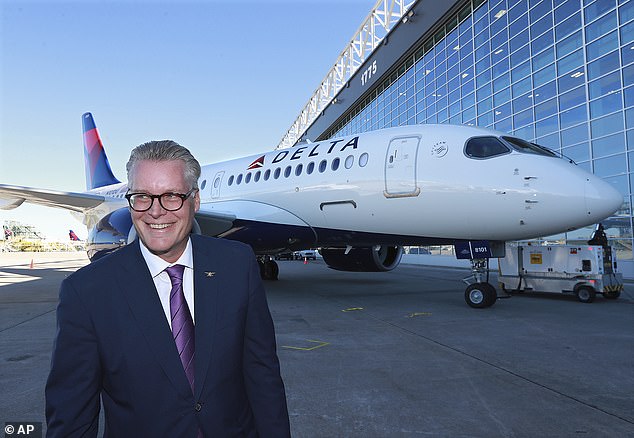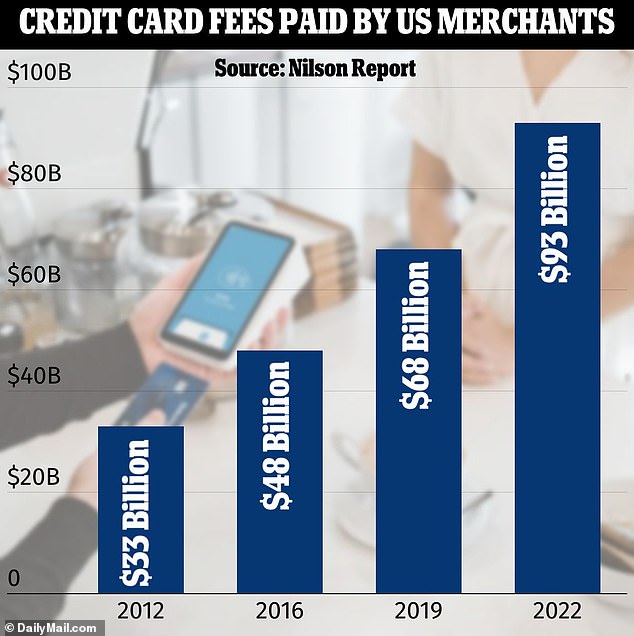United Airlines CEO says credit card rewards programs could soon be phased out thanks to Congress bill on swipe fees
United Airlines CEO Scott Kirby has said proposed legislation to reduce credit card fees would put an end to rewards and miles programs.
The Credit Card Competition Act, proposed by Senator Dick Durbin, plans to end what he calls the “Visa-Mastercard duopoly” in credit card transactions.
Together, the companies control 83 percent of the U.S. credit card market, charging merchants an average transaction fee of 2.24 percent of the total transaction – and as much as 4 percent for premium travel and rewards cards.
These so-called “swipe fees” have become too much of a cost for many retailers and businesses to absorb, meaning they pass on higher prices to consumers.
“This would kill rewards programs,” Kirby said on an earnings call. ‘It wouldn’t exist anymore. It will destroy debit card rewards programs if it happens, and I think it’s bad policy.”
United Airlines CEO Scott Kirby has said proposed legislation to reduce credit card fees would put an end to rewards and miles programs
Senate Democratic Whip Durbin, who introduced the bill in June, aims to bring competition to the marketplace by requiring banks to allow at least one payment network besides Visa or Mastercard for credit card transactions.
“It is long past time for Congress to break the sweetheart deal that Visa, Mastercard and the big banks enjoy,” he said of the bipartisan legislation earlier this month.
Advocates hope the competition will push the payments giants to lower their rates. In the European Union, fees were limited to 0.3 percent in 2015.
During the Oct. 18 earnings call, Kirby said the vast majority of consumers have a rewards card.
‘Almost everyone has one. And they like them a lot,” he said. ‘Our customers certainly like them very much. And so I think it’s going to be difficult in Congress to vote that 84 percent of your voters are going to be angry with the outcome of that vote.”
Other airline bosses have also argued that the legislation would jeopardize their ability to offer rewards programs.
Major banks that partner with airlines on credit cards purchase loyalty program miles or points from the airlines to distribute to customers.
The airlines get paid every time a cardholder makes a transaction. They argue that the bill would cut revenues for Visa and Mastercard, making the payments giants less willing to participate in rewards programs.
This is what Ed Bastion, CEO of Delta Air Lines, says Bloomberg earlier this month: “These cards could no longer receive the funding to invest in rewards opportunities. It’s something we’re obviously looking at.”
According to the newspaper, Delta will receive $7 billion this year from its program with American Express.
Bastion predicted that any changes to the cards would lead to an “incredible” response from consumers. The airline reversed many of the changes it made to its SkyMiles rewards program after facing extreme customer backlash earlier this year.

Delta Air Lines CEO Ed Bastian said the bill would result in “incredible” consumer backlash because of its effect on rewards programs
Retailers have long complained that swipe fees in the US are much higher than anywhere else in the world.
Small business owner Danny Reynolds told DailyMail.com how he pays so much in credit card fees that it is equivalent to the salary of an entry-level employee at Stephenson’s of Elkhart, a clothing store in Elkhart, Indiana.
Merchants paid an estimated $93 billion in Visa and Mastercard fees last year, according to an industry publication The Nilson Report – compared to about $33 billion in 2012.

According to industry publication The Nilson Report, merchants paid an estimated $93 billion in Visa and Mastercard fees last year – up from about $33 billion in 2012
Supporters of the bill say it would provide $15 billion in savings for retailers and small businesses.
They refute the argument that banks could not continue to support rewards programs if adopted – and point to the EU where programs still exist despite caps on fees.
It comes as the Federal Reserve on Wednesday proposed cutting by nearly a third the amount of swipe fees banks can charge merchants for processing debit card transactions.
The central bank proposed lowering the current limit from 21 cents per transaction to 14.4 cents per transaction.
